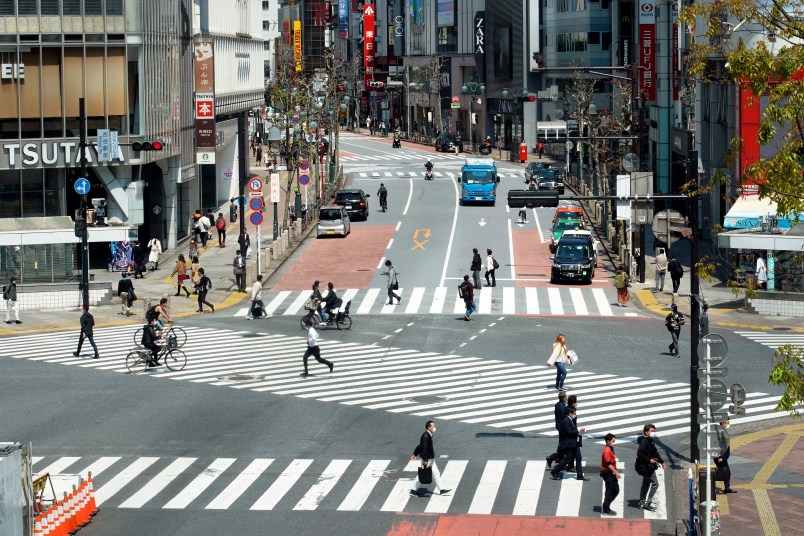TOKYO (AP) — Prime Minister Shinzo Abe has declared a state of emergency in Tokyo and six other hard-hit Japanese prefectures to fortify the fight against the coronavirus outbreak. But this is no European or Wuhan-style lockdown. A look at what Japan’s state of emergency entails:
Q. WHY DID ABE DECLARE A STATE OF EMERGENCY?
A. Abe was facing heavy pressure to declare a state of emergency after the number of new cases in Tokyo began doubling every several days in late March. The city of 14 million had 1,339 cases as of Wednesday, up from about 600 a week earlier. Japan focused on dealing with clusters of infections and selective testing for the virus, a strategy that has failed to curb its spread. Experts found that one-third of Tokyo’s recent cases were linked to hostess clubs and other night entertainment districts where cluster tracing is difficult. Meanwhile, compliance with calls for working remotely and other social distancing has been weak.
___
Q. IS ALL OF JAPAN AFFECTED?
A. The state of emergency announced Tuesday applies to only Tokyo, neighboring Chiba, Kanagawa and Saitama, Osaka, and Hyogo in the west and Fukuoka in the south. That is only seven of Japan’s 47 prefectures. Residents are requested to avoid nonessential trips within and outside the designated areas, but there are no restrictions on travel. Some Tokyo residents drew criticism for rushing to escape from Tokyo to the countryside.
___
Q. DOES A STATE OF EMERGENCY CAUSE A TOKYO LOCKDOWN?
A. No, Abe and officials say Japan cannot legally enforce hard lockdowns. Public transportation is operating as normal. Most state of emergency measures are requests and instructions. Violators cannot be punished unless they fail to comply with orders related to storage or shipment of emergency relief goods and medical supplies.
___
Q. WHY IS JAPAN NOT IMPOSING A HARD LOCKDOWN?
A. Japan’s history of repression under fascist governments before and during World War II has left the public wary of government overreach. The country’s postwar constitution lays out strict protections for civil liberties. Abe’s government was reluctant to risk severe economic repercussions from more severe measures.
____
Q. WHAT MEASURES ARE TAKEN IN A STATE OF EMERGENCY?
A. The state of emergency allows prefectural leaders to ask residents to stay home. They can also request closures of schools, some child and senior care or community centers, and stores and businesses that are considered nonessential. They can advise organizers to cancel or postpone events. The governors can also request use of private property to build hospitals and other medical facilities.
___
Q. WHAT ARE ESSENTIAL ACTIVITIES?
A. Essential activities and facilities, including banks, grocery stores, postal services, pharmacies and utility companies, remain open. Some retail stores and entertainment venues such as movie theaters, concert halls and amusement parks can be asked to shut down. Public schools in Tokyo and some neighboring prefectures already are closed until at least early May.
___
Q. CAN PEOPLE STILL GO OUT?
A. Yes, residents can go out for purposes considered essential, including work, hospital visits and grocery shopping, according to a Cabinet Office statement. Residents in designated areas can still go out for a walk, a jog or other individual exercise.
___
Q. HOW EFFECTIVE IS THE MEASURE?
A. Abe on Wednesday repeated his request for the people to stay home and reduce interactions with others by up to 80%. But in Tokyo’s downtown Shibuya district, business was almost normal. Rush hour trains were still crowded and commuters were heading to work, though fewer people were seen in other areas of the capital. Akihito Aminaka, an education industry worker, said heeding Abe’s request was difficult because “to me, it sounds like they’re saying, ‘Please don’t go out, but we won’t help you.’”
___
Q. WHAT’S THE POTENTIAL ECONOMIC IMPACT?
A. Abe also announced an unprecedented 108 trillion yen ($1 trillion) stimulus package, equivalent to about a fifth of Japan’s annual GDP, to pay for coronavirus measures and protect businesses and jobs. It includes 300,000 yen ($2,750) cash handouts for some hard-hit households. A monthlong state of emergency in the Tokyo area could cause consumer spending to fall nearly 2.5 trillion yen ($23 billion), according to Nomura Research Institute.
___
Follow Mari Yamaguchi on Twitter at https://www.twitter.com/mariyamaguchi







Confirmation that it was a good idea to shut down the 2020 Olympics.
I think we’re going to see what a worse case scenario looks like in Japan.
It looks like the country with the oldest population is in for a world of death.
Maybe we can send them the esteemed Dr. Jared WonderKush to save the day? Or gouge them for PPE from the Trump National Stockpile?
Abe wears mask…
Covidiot Trump will NOT wear mask…
My fear as well. My in-laws are in their 80s and my father-in-law already suffers from lung problems. At least we’ve finally got them to stay home.